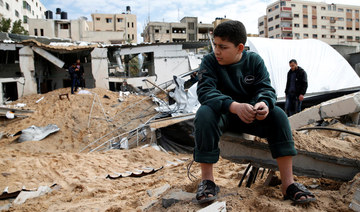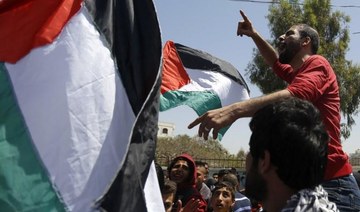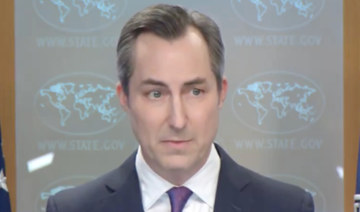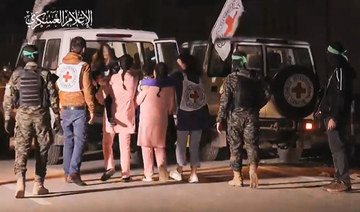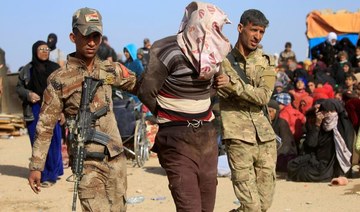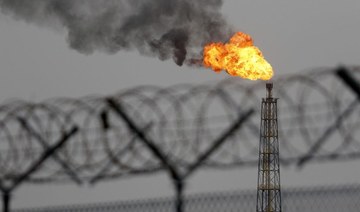GAZA CITY: Hamas is facing the biggest demonstrations yet against its 12-year rule of the Gaza Strip, with hundreds of Palestinians taking to the streets in recent days to protest the dire living conditions in the blockaded territory.
With little tolerance for dissent, the militant group has responded with heavy-handed tactics. It has arrested dozens of protesters, beaten activists and violently suppressed attempts by local media to cover the unrest.
Hamas has accused the rival West Bank-based Palestinian Authority of orchestrating the protests — a charge that organizers vehemently reject.
“There is no political agenda at all,” said Amin Abed, 30, an organizer who has been forced into hiding. “We simply want to live in dignity,” he said by telephone. “We just ask Hamas to ease the economic hardships and tax burdens.”
Hamas seized control of Gaza in 2007 from the forces of Palestinian President Mahmoud Abbas. Israel and Egypt imposed a blockade, a step meant to prevent Hamas from arming.
The blockade, and three wars with Israel, have ravaged Gaza’s economy but done nothing to loosen Hamas’ grip on power.
Unemployment is over 50 percent and much higher for young university graduates like Abed. Tap water is undrinkable, electricity is limited and travel abroad severely restricted. Hamas’ cash-strapped government recently raised taxes on basic goods like bread, beans and cigarettes.
Protesters accuse Hamas of corruption and imposing the hefty taxes to enrich itself. They used social media to organize protests last week with the slogan “We want to live!”
The protests come just as Hamas marks the one-year anniversary of its weekly demonstrations along the frontier with Israel. The demonstrations, aimed largely at easing the blockade, have accomplished little, even as some 190 Palestinians have been killed and thousands wounded by Israeli fire.
This is not the first time people have taken to the streets against Hamas. Two years ago, protesters demonstrated against the chronic power cuts on a cold January day before Hamas violently dispersed them. This time around, the sporadic rallies have continued for five days, despite a similarly violent response.
“These protests were the largest, the longest and the most violent in terms of Hamas’ suppression,” said Mkhaimar Abusada, political science professor at Gaza’s Al-Azhar University.
“This was a message of anger to Hamas that the situation is unbearable and that it must reconsider all its policies,” he added.
On Monday, Amnesty International reported that hundreds of protesters have been beaten, arbitrarily arrested, tortured and subjected to ill-treatment. Journalists and human rights workers, including a researcher for the London-based organization, were also roughed up, Amnesty said.
“The crackdown on freedom of expression and the use of torture in Gaza has reached alarming new levels,” said Amnesty’s Middle East deputy director Saleh Higazi.
Osama Al-Kahlout, a journalist with the local news site Donia Al-Wattan, last week published a photo of a protester on crutches raising a sign that said “I want to live in dignity.” The next day, he was detained as he went live on Facebook during another protest.
Al-Kahlout said police smashed furniture, seized his belongings and beat him on the way to the police station. “I’m a journalist,” he said. “I don’t regret covering it.”
He said he was released after a meeting with the police chief in which officials “advised” journalists not to cover the protests.
Heba el-Buhissi, 31, who filmed the raids at her family home, said a policeman fired a warning shot in the air as others cursed and yelled at her after she started filming. Her videos show a group of Hamas police beating her cousin with wooden batons.
Other amateur videos have shown protesters burning tires and hurling stones toward Hamas forces. Hamas gunmen can be seen jumping out of vehicles and beating people with clubs. Other videos show Hamas going door to door and carrying out mass arrests.
El-Buhissi filmed the incident last Thursday when she saw Hamas dispersing some of her neighbors who had hoisted banners against tax hikes. Her family opened the home to allow youths to escape the police.
“This is what drove the police crazy, and that’s why they stormed our houses,” she said. “I felt I have to film to prove what was going on.”
The Brussels-based International Federation of Journalists reported Monday that 42 Palestinian journalists “were targeted” by Hamas forces in the past five days. The abuses included physical assaults, summons, threats, home arrests and seizure of equipment.
The official Palestinian Authority news agency Wafa reported Monday that the spokesman of Abbas’ Fatah movement in Gaza, Atef Abu Saif, was badly beaten by Hamas.
It showed pictures of Abu Said with a bandaged leg, bruises and blood-stained clothes lying on a hospital bed.
Ammar Dwaik, director of the Independent Commission for Human Rights in Gaza, said Hamas forces have dispersed 25 protests with excessive force and arrested about 1,000 people. He said some 300 people remain in custody.
“This is worst crackdown in Gaza since the Hamas takeover in 2007 in terms of its scope and cruelty,” Dwaik said.
On Tuesday, Hamas issued a brief statement “rejecting the use of violence and repression against any Palestinian for practicing his legitimate right of expression.”
But Sami Abu Zuhri, a Hamas official, used tougher language in a Twitter post, accusing Israel and the Palestinian Authority of conspiring to organize protests. “The attempts of the Palestinian Authority and the occupation to drive a wedge between the people and the resistance have failed,” he said.
The demonstrations appeared to subside on Monday, but organizers say the protests will continue until Hamas cancels taxes on dozens of goods, creates a national employment program and releases everyone who has been arrested in the crackdown.
Abed, the protest leader, said Hamas has stormed his family’s house and delivered an arrest warrant for him to his father.
“Hamas doesn’t want us to scream. It wants us to die in silence,” he said.
Rare protests erupt against Hamas’ 12-year rule over Gaza
Rare protests erupt against Hamas’ 12-year rule over Gaza
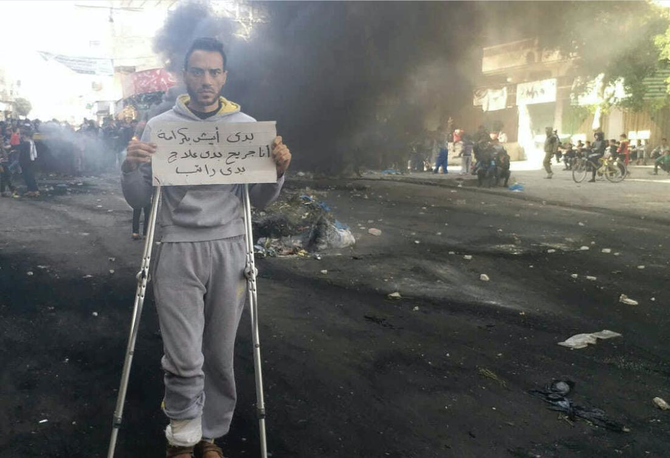
- Unemployment is over 50 percent and much higher for young university graduates
- Tap water is undrinkable, electricity is limited and travel abroad severely restricted
Another former US State Department official alleges Israeli military gets ‘special treatment’ on abuses
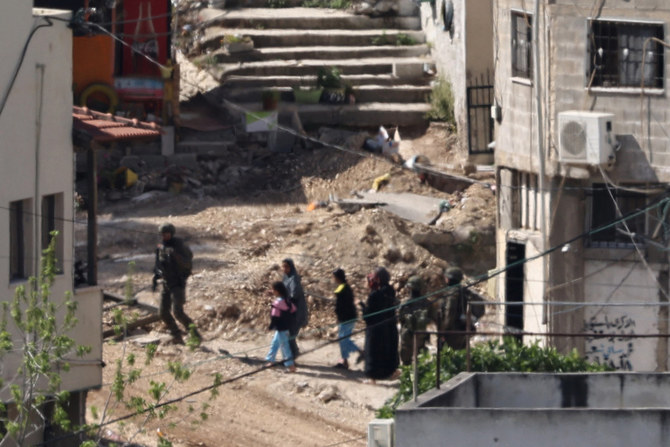
- “In my experience, Israel gets special treatment that no other country gets,” says Charles O. Blaha, former director of a State Department security and human rights office
- Late last year, Josh Paul resigned as a director overseeing arms transfers to other countries’ militaries in October in protest of the US rushing arms to Israel amid its war in Gaza
WASHINGTON: A former senior US official who until recently helped oversee human-rights compliance by foreign militaries receiving American military assistance said Wednesday that he repeatedly observed Israel receiving “special treatment” from US officials when it came to scrutiny of allegations of Israeli military abuses of Palestinian civilians.
The allegation comes as the Biden administration faces intense pressure over its ally’s treatment of Palestinian civilians during Israel’s war against Hamas in Gaza. And it matters because of who said it: Charles O. Blaha.
Before leaving the post in August, he was a director of a State Department security and human rights office closely involved in helping ensure that foreign militaries receiving American military aid follow US and international humanitarian and human rights laws.
Blaha said his departure from the State Department after decades of service was not related to the US-Israeli security relationship. He is the second senior State official involved in that relationship to assert that when it comes to Israel, the US is reluctant to enforce laws required of foreign militaries receiving American aid.
“In my experience, Israel gets special treatment that no other country gets,” Blaha said. “And there is undue deference, in many cases, given” to Israeli officials’ side of things when the US asks questions about allegations of Israeli wrongdoing against Palestinians, he added.
He spoke to reporters at an event where he and other members of an unofficial, self-formed panel of former senior US civilian and military officials released a report pointing to civilian deaths in specific airstrikes in Gaza. They said there was “compelling and credible” evidence that Israeli forces had acted illegally.
Blaha’s comments echoed those of another State Department official and panel member, Josh Paul. Paul resigned as a director overseeing arms transfers to other countries’ militaries in October in protest of the US rushing arms to Israel amid its war in Gaza.
Asked about the allegations from the two, a State Department spokesman, Vedant Patel, said “there is no double standard, and there is no special treatment.”
Israeli officials did not immediately respond to a request for comment. Israel consistently says it follows all laws in its use of US military aid, investigates allegations against its security forces and holds offenders accountable.
Israel historically is the United States’ biggest recipient of military aid, and Biden on Wednesday signed legislation for an additional $26 billion in wartime assistance. But Biden has come under growing pressure over that support as Palestinian deaths mount.
The latest Israel-Hamas war began on Oct. 7, when Hamas and Islamic Jihad, two militant groups backed by Iran, carried out a cross-border attack that killed 1,200 people in Israel. Israel responded with an offensive in Gaza that has caused widespread devastation and killed more than 34,000 people, according to local health officials.
In coming days, the administration says it will announce its official findings from reviews it did into allegations of especially serious human rights abuses by specific Israeli military units. Those units would be barred from receiving US military aid if the US review confirms those allegations.
Separately, the Biden administration also is expected to disclose by May 8 whether it has verified assurances from Israel that the country is not using US military aid in a way that violates international or human rights law. Both Israel’s written assurance and the US verification were mandated by a new presidential national security memo that Biden issued in February.
The February agreement was negotiated between the Biden administration and members of his own Democratic Party, who had been pushing for the US to begin conditioning military aid to Israel on improving treatment of Palestinian civilians.
Panel members released their report Wednesday to urge the US to scrutinize specific attacks in Gaza that the former officials argued should lead to a conclusion that Israel was wrong when it confirmed it was complying with the laws. If that determination is made, the US could then suspend military aid.
Wednesday’s unofficial report points to 17 specific strikes on apartments, refugee camps, private homes, journalists and aid workers for which the former US officials and independent experts allege there’s no evidence of the kind of military target present to justify the high civilian death tolls.
They include an Oct. 31 airstrike on a Gaza apartment building that killed 106 civilians, including 54 children. Israeli officials offered no reason for the strike, and a Human Rights Watch probe found no evidence of a military target there, the officials said. Israel has said in many of the instances that it is investigating.
Hamas releases video showing well-known Israeli-American hostage
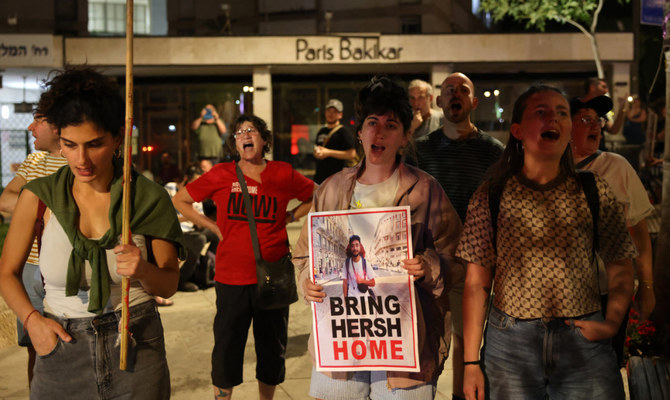
- Goldberg-Polin is one of the most recognized captives. Posters with his image are pinned up across Israel
JERUSALEM: Hamas released a hostage video on Wednesday showing a well-known Israeli-American man who was among scores of people abducted by the militants in the attack that ignited the war in Gaza.
The video was the first sign of life of Hersh Goldberg-Polin since Hamas’ Oct. 7 attack on southern Israel, and its release ignited new protests in Jerusalem calling on the government to do more to secure the captives’ release.
In the video, Goldberg-Polin accused Israel’s government of abandoning the people who are being held hostage by Hamas. He also claimed that some 70 captives have been killed in Israel’s bombing campaign. Goldberg-Polin was clearly speaking under duress, and the claim could not be independently verified. It was not clear when the video was made.
Goldberg-Polin, 23, was at the Tribe of Nova music festival when Hamas launched its attack from nearby Gaza. In the video, Goldberg-Polin is missing part of his left arm.
Witnesses said he lost it when attackers tossed grenades into a shelter where people had taken refuge. He had tied a tourniquet around it before being bundled into the truck by Hamas.
Goldberg-Polin is one of the most recognized captives. Posters with his image are pinned up across Israel. His mother, Rachel Goldberg, has met with world leaders and addressed the United Nations.
Though there was no date on the video, Goldberg-Polin appeared to reference the weeklong Jewish holiday of Passover, which began on Monday.
His parents said they were relieved to see him alive but were concerned about his health and well-being, as well as that of the other hostages.
“We are here today with a plea to all of the leaders of the parties who have been negotiating to date,” said his father, Jon Polin, naming Egypt, Israel, Qatar, the United States and Hamas.
“Be brave, lean in, seize this moment and get a deal done to reunite all of us with our loved ones and end the suffering in this region,” he said.
Hostages’ families have accused Israeli Prime Minister Benjamin Netanyahu’s government of not doing enough to secure the release of their relatives.
After the Hamas video was made public, hundreds of Israelis gathered outside Netanyahu’s official residence in central Jerusalem on Wednesday, calling on the government to strike a deal to bring home hostages. Many held posters of Goldberg-Polin, and some of the protesters set cardboard boxes on fire.
“We are afraid for his life, so we went to protest and call for the government to do whatever is possible to bring him and everybody else back, as soon as possible,” said one of the marchers, Nimrod Madrer. “Bring them back home,” the crowd chanted.
At the nearby Great Synagogue, a large crowd jeered the country’s ultranationalist national security minister, Itamar Ben-Gvir, chanting “shame” as he exited the building following a Passover gathering. One protester banged on Ben-Gvir’s car and was pushed away by police as it drove off.
Hamas and other militants abducted around 250 people in the Oct. 7 attack and killed around 1,200, mostly civilians. They are still believed to be holding around 100 hostages and the remains of some 30 others. Most of the rest were freed in November in exchange for the release of 240 Palestinians imprisoned by Israel.
Khalil Al-Hayya, a senior Hamas official, said Goldberg-Polin’s family had asked mediators to inquire about his fate for humanitarian reasons.
His family was “searching the world for any sign of him,” Al-Hayya said in an interview with Hamas-run Al-Aqsa TV broadcast on Wednesday. Hamas’ armed wing ”sent a strong message by publishing this young man’s message directed at Netanyahu,” Al-Hayya said.
The US, Qatar and Egypt have spent months trying to broker another ceasefire and hostage release, but the talks appear to have stalled. Hamas has said it will not release the remaining hostages unless Israel ends the war, which has killed over 34,000 Palestinians, according to local officials.
Netanyahu has rejected those demands, and says Israel remains committed to destroying Hamas and bringing all the hostages home. He has come under mounting criticism in Israel, where some say it will be impossible to do both.
Wars in Gaza and Sudan ‘drive hunger crisis affecting 280 million worldwide’
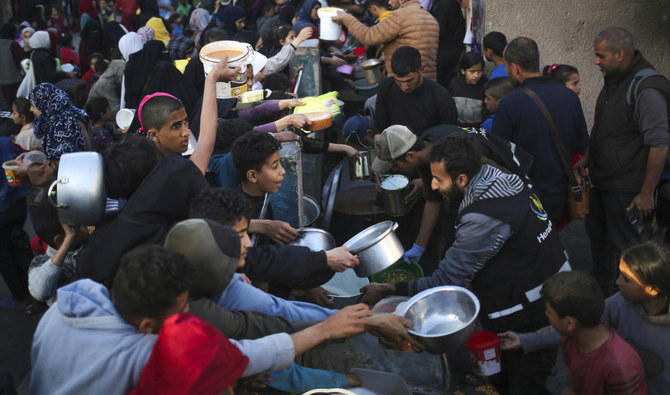
- New report on global food insecurity says outlook for 2024 is ‘bleak’
JEDDAH: More than 280 million people worldwide suffered from acute hunger last year in a food security crisis driven by conflicts in Gaza and Sudan, UN agencies and development groups said on Wednesday.
Economic shocks also added to the number of victims, which grew by 24 million compared with 2022, according to a report by the Food Security Information Network.
The report, which called the global outlook for this year “bleak,” is produced for an international alliance of UN agencies, the EU and governmental and non-governmental bodies.
Food insecurity is defined as when populations face food deprivation that threatens lives or livelihoods, regardless of the causes or length of time. More geographical areas experienced “new or intensified shocks” and there was a “marked deterioration in key food crisis contexts such as Sudan and the Gaza Strip,” said Fleur Wouterse, a senior official at the UN’s Food and Agricultue Organization.
Since the first report by the Global Food Crisis Network covering 2016, the number of food-insecure people has risen from 108 million to 282 million, Wouterse said. The share of the population affected within the areas concerned had doubled from 11 percent to 22 percent, she said.
Protracted major food crises are ongoing in Afghanistan, the Democratic Republic of Congo, Ethiopia, Nigeria, Syria and Yemen. “In a world of plenty, children are starving to death,” UN Secretary-General Antonio Guterres said.
“War, climate chaos and a cost-of-living crisis, combined with inadequate action, mean that almost 300 million people faced acute food crisis in 2023. Funding is not keeping pace with need.”
According to the report, situations of conflict or insecurity have become the main cause of acute hunger. For 2024, progress would depend on the end of hostilities, said Wouterse, who said aid could rapidly alleviate the crisis in Gaza or Sudan, for example, once humanitarian access to the areas was possible.
Yemen’s Houthis say they targeted American and Israeli ships

- The Iran-aligned group said it targeted the US ship Maersk Yorktown, an American destroyer in the Gulf of Aden and Israeli ship MSC Veracruz in the Indian Ocean
- “The Yemeni armed forces confirm they will continue to prevent Israeli navigation,” Sarea said
CAIRO/DUBAI: Houthi militants in Yemen have attacked what they said were two American ships and an Israeli vessel, the group’s military spokesman said on Wednesday, the first such attack in more than two weeks.
The Iran-aligned group said it targeted the US ship Maersk Yorktown, an American destroyer in the Gulf of Aden and Israeli ship MSC Veracruz in the Indian Ocean, the spokesman, Yahya Sarea, said in a televised speech.
Yemen’s Houthis have been attacking ships in the Red Sea region since November in what they say is a campaign of solidarity with Palestinians fighting Israel in Gaza.
“The Yemeni armed forces confirm they will continue to prevent Israeli navigation or any navigation heading to the ports of occupied Palestine in the Red and Arabian Seas, as well as in the Indian Ocean,” Sarea said on Wednesday.
Separately, British maritime security firm Ambrey said earlier on Wednesday that it was aware of an incident southwest of the port city of Aden, an area where the Houthis often target ships they say are linked to Israel or the United States.
The vessel reported an “explosion in the water” approximately 72 nautical miles east-southeast of Djibouti, an updated advisory from Ambrey said.
Houthi attacks have disrupted global shipping through the Suez Canal, forcing firms to re-route to longer and more expensive journeys around southern Africa. The United States and Britain have launched strikes on Houthi targets in Yemen.
Iraq hangs 11 convicted of ‘terrorism’: security, health sources
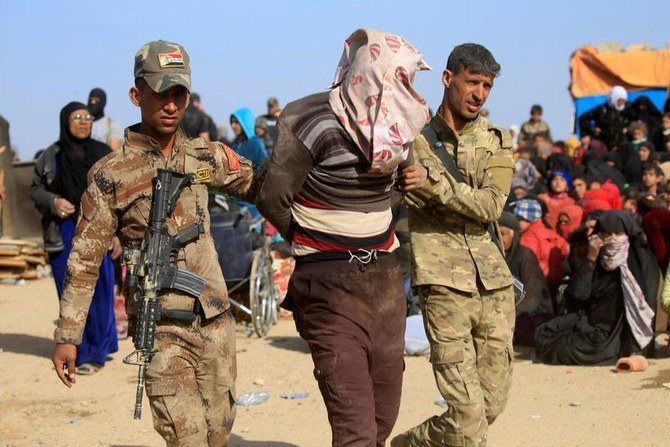
- Under Iraqi law, terrorism and murder offenses are punishable by death, and execution decrees must be signed by the president
- A security source in Iraq’s southern Dhi Qar province told AFP that 11 “terrorists from the Daesh group” were executed by hanging at a prison in Nasiriyah
NASIRIYAH, Iraq: Iraqi authorities have executed at least 11 people convicted of “terrorism” this week, security and health sources said Wednesday, with rights group Amnesty International condemning an “alarming lack of transparency.”
Under Iraqi law, terrorism and murder offenses are punishable by death, and execution decrees must be signed by the president.
A security source in Iraq’s southern Dhi Qar province told AFP that 11 “terrorists from the Daesh group” were executed by hanging at a prison in the city of Nasiriyah, “under the supervision of a justice ministry team.”
A local medical source confirmed that the health department had received the bodies of 11 executed people.
They were hanged on Monday “under Article 4 of the anti-terrorism law,” the source added, requesting anonymity due to the sensitivity of the issue.
All 11 were from Salahaddin province and the bodies of seven had been returned to their families, the medical official said.
Iraqi courts have handed down hundreds of death and life sentences in recent years for people convicted of membership in “a terrorist group,” an offense that carries capital punishment regardless of whether the defendant had been an active fighter.
Iraq has been criticized for trials denounced by rights groups as hasty, with confessions sometimes obtained under torture.
Amnesty in a statement on Wednesday condemned the latest hangings for “overly broad and vague terrorism charges.”
It said a total of 13 men were executed on Monday, including 11 who had been “convicted on the basis of their affiliation to the so-called Daesh armed group.”
The two others, arrested in 2008, “were convicted of terrorism-related offenses under the Penal Code after a grossly unfair trial,” Amnesty said citing their lawyer.



